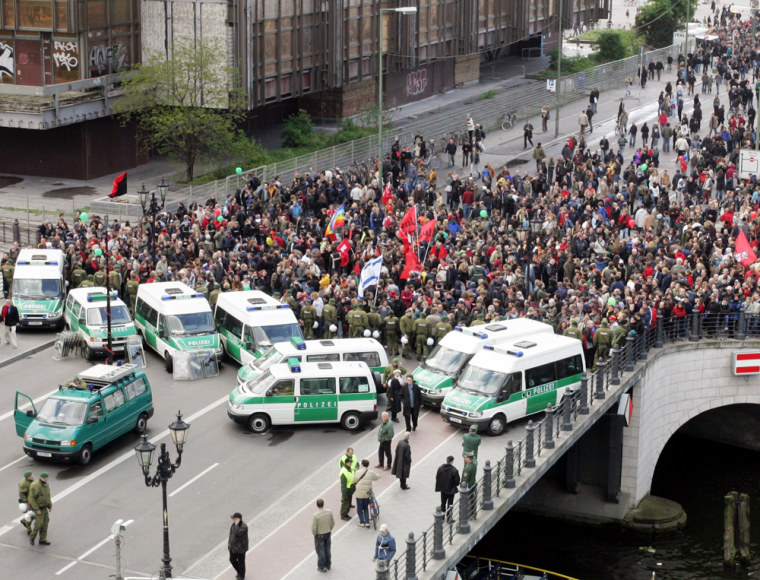A neo-Nazi march in Berlin was stopped by thousands of anti-fascist demonstrators on Sunday after a tense standoff that overshadowed Germany’s ceremonies marking the end of World War II in Europe 60 years ago.
Berlin police said 6,000 demonstrators opposed to the far-right National Democratic Party (NPD) crowded into streets around Alexanderplatz square where 3,300 right-wing extremists gathered to protest what they called a German “cult of guilt.”
Eager to prevent the violence that flares when leftists try to stop far-right marches, authorities ordered the NPD to stay at Alexanderplatz behind a buffer zone of barricades and police.
“This is a disgrace,” German Interior Minister Otto Schily said of the rally.
Meanwhile, several thousand counter-demonstrators headed toward the far-right rally on Berlin’s Unter den Linden boulevard to try to block the planned march. Police sealed off much of central Berlin to prevent clashes.
Rally thwarted ‘with peaceful means’
Two hours later the NPD decided to abandon the march. Anti-Nazi demonstrators cheered when police announced on loudspeakers that the march was canceled.
“With peaceful means, the public showed these Nazis who were trying to glorify the greatest genocide in history will never again have any role in Germany,” said Juergen Trittin, a minister in Chancellor Gerhard Schroeder’s government.
Holding one of their biggest rallies ever — thanks to constitutional free speech guarantees — the far-right then stayed at the Alexanderplatz square, where there were some scuffles with leftists who got close to barricades.
Police arrested 42 people — 32 leftists and 10 rightists — for throwing bottles or using the outlawed “Hitler salute”. There was also one firebomb thrown at the neo-Nazis.
Most Germans see May 8, 1945 as a day of liberation. The motto of the anti-Nazi rally borrowed the word for “Thanks” in Russian: “Spasibo — We say thank you.” Some carried banners reading “Fascism never again” and “War never again.”
The NPD had wanted to march through the Brandenburg Gate, a symbol of unification, and past a new Holocaust memorial.
The extremists with shaven heads and black clothing were required to pass through tight police screening to the rally.
In a speech in parliament, President Horst Koehler said most Germans were relieved “and numbed” when the war ended.
German president condemns ‘incorrigibles’
“There are unfortunately incorrigibles still among us who want a return to the racism and right-wing extremism,” Koehler said. “But they don’t have a chance.”
“We feel disgust and contempt for those guilty of these crimes against humanity who dishonoured our country,” he said.
Officials refused the far-right group permission to march to Germany’s new Holocaust memorial, a block from the Brandenburg Gate, under a new law banning gatherings that insult the memory of Nazi victims.
Nearby, Schroeder and other top politicians attended a wreath-laying ceremony at Berlin’s monument to the victims of war and Nazism, which contains the remains of an unknown soldier and an unknown concentration camp victim.
At St. Hedwig’s Cathedral, Schroeder and other German dignitaries listened to church leaders recall the horrors of war and express gratitude for Germany’s postwar revival, completed in 1990 with German reunification.
'Catastrophe' for Germans
Most Germans consider Hitler’s defeat to have liberated them as well as the rest of Europe from the terrors of Nazism.
“It was not only the end of a terrible reign of terror but also ... the day of a new beginning,” Cardinal Karl Lehmann, head of Germany’s Roman Catholic church, said at the service. “We had to newly define ourselves. We had radically lost our way into barbarism.”
But the war also was a “catastrophe” for Germans, notably those who fled or were expelled from eastern Europe, Lehmann said.
“With the expulsions, Hitler’s crimes rebounded terribly also on the Germans in the east,” he said. “We have too little awareness of that, even today.”
Other ceremonies in Berlin on Sunday included a “Day of Democracy” rally sponsored by churches and labor unions.
The Holocaust memorial, a field of 2,700 somber concrete slabs just south of the Brandenburg Gate, is to be dedicated on Tuesday and opened to the public Thursday.
